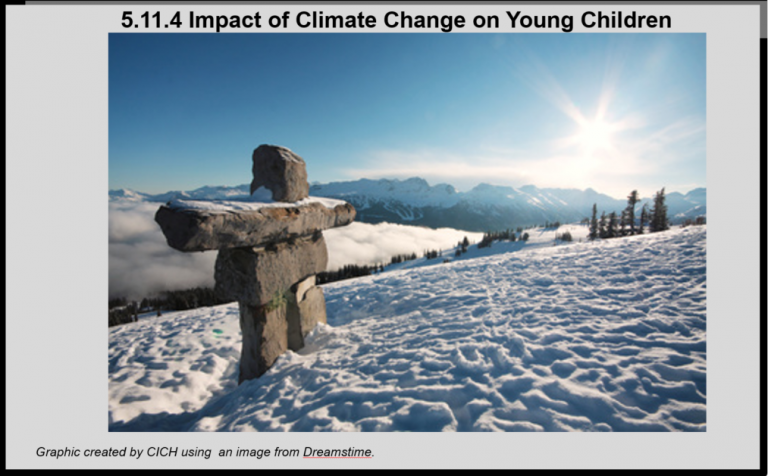Impact of climate change on young children

Climate change is unequivocal – the earth’s temperature is rising, causing changes in weather patterns and meteorological events of increased frequency and intensity.1
Effects of climate change have already been seen and felt throughout Canada and worldwide.2
As some greenhouse gases remain in the atmosphere for hundreds or thousands of years, greenhouse gas emissions will drive climate change indefinitely.2
Because of their developing body systems, young children are less able than adults to adapt to heat and other climate-related conditions – both physiologically and metabolically. Because of their developing immune systems, they are at a greater risk of getting diseases and dying from them. They are also more likely to be killed or injured during climate change related events and disasters.3
1 Intergovernmental Panel on Climate Change (IPCC). 2013: Summary for Policymakers. In: Climate Change 2013: The Physical Science Basis. Contribution of Working Group 1 to the Fifth Assessment Report of the Intergovernmental Panel on Climate Change [Stocker, T.F., D. Qin, G.-K. Plattner, M. Tignor, S.K. Allen, J. Boschung, A. Nauels, Y. Xia, V. Bex and P.M. Midgley (eds.)]. Cambridge University Press, Cambridge, United Kingdom and New York, NY, USA. http://www.ipcc.ch/pdf/assessment-report/ar5/wg1/WG1AR5_SPM_FINAL.pdf– accessed March 12th, 2017.
2Lemmen, D.S., Warren, F.J., Lacroix, J., and Bush, E., editors (2008): From Impacts to Adaptation: Canada in a Changing Climate 2007: Government of Canada, Ottawa, ON, 448 p. http://www.nrcan.gc.ca/sites/www.nrcan.gc.ca/files/earthsciences/pdf/assess/2007/pdf/full-complet_e.pdf– accessed March 12th, 2017.
3UNICEF. Children’s Vulnerability to Climate Change and Disaster Impacts in East Asia and the Pacific. 2011. https://www.unicef.org/environment/files/Climate_Change_Regional_Report_14_Nov_final.pdf-accessed July 24, 2017.
Implications
Indigenous people have a strong dependence upon and close relationship with the environment and its resources.1 Because of this, they are directly impacted by climate change. Climate change is expected to result in changes in the availability of water, terrestrial and freshwater species, communities and ecosystems; changes in sea levels and declines in ice volume; and rising temperatures, increased fire activity, and greater unpredictability of weather. These changes are likely to cause adverse health impacts from heat-related mortality, injuries and fatalities, and the spread of vector-borne infectious diseases.2 Climate change impacts have already been experienced by Indigenous peoples in Canada, especially in Arctic regions where changes affecting access to and availability of traditional food sources are posing challenges to Arctic peoples’ safety, health and food security. Because Indigenous peoples’ psychological well-being is intimately connected to the land, climate change impacts on traditional economies and resource use also erode Indigenous peoples’ social life, culture and traditional knowledge, and can lead to spiritual suffering. As a result, climate change is both an environmental and human rights issue for Indigenous peoples.3
1United Nations Permanent Forum on Indigenous Issues. (n.d.). Climate change and Indigenous peoples – Backgrounder. Retrieved October 12, 2017 from http://www.un.org/en/events/indigenousday/pdf/Backgrounder_ClimateChange_FINAL.pdf
2Williams, J. (2012). The impact of climate change on Indigenous people – the implications for the cultural, spiritual, economic and legal rights of Indigenous people. The International Journal of Human Rights, 16(4), 648-688.
3Directorate B – Policy Department. (2009). Indigenous peoples and climate change. European Union, Directorate-General for External Policies of the Union. Retrieved October 12, 2017 from https://cmsdata.iucn.org/downloads/european_parliament_study_on_indigenous_peoples_and_climate_change.pdf
